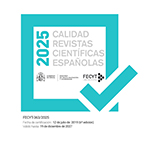Mujeres ecuatorianas en la educación superior: (im)percepción de la doble presencia y la naturalización de los roles de género durante la pandemia ocasionada por Covid-19
Resumen
Introducción. El estudio tiene como objetivo identificar cambios en la carga de trabajo de mujeres y hombres de la educación superior en las labores del hogar y del cuidado durante la contingencia, y su relación con los roles de género y los factores que influyen su naturalización en Ecuador. Metodología. A partir de la aplicación de una metodología cuantitativa se pudo observar que durante la contingencia registraron un aumento en las horas dedicadas al hogar, sin embargo, las mujeres siguen dedicando más horas a las labores del hogar y del cuidado que los hombres. Resultados. El análisis de las encuestas reportó que el nivel de cansancio de ellas era mayor que el de ellos, y que las mujeres sufrieron mayor afectación en el rendimiento académico, además, de una mayor preocupación por perder su vínculo laboral y/o académico. Empero, tanto mujeres como hombres manifestaron que las labores del hogar y del cuidado están distribuidas de forma equitativa. Conclusiones. El contexto sociopolítico antes de la pandemia ya suponía un escenario de desventaja para las mujeres, el cual se agravó por el confinamiento, al existir una profunda interiorización de los roles de género, que las vincula al trabajo del hogar por “amor” a la familia. Entonces, se demuestra que siguen operando limitaciones para las mujeres en la academia, impuestas por los roles de género preestablecidos. Aportaciones. Así, el estudio aborda un tópico poco desarrollado y muy actual, reflexiona a propósito de la compleja situación de las mujeres que durante la pandemia intentan llevar a cabo sus actividades de superación académica, subvirtiendo una discriminación histórica, y se trabaja además, con una perspectiva cuantitativa, usada menos en este tipo de investigaciones, estableciendo nexos contextuales fundamentales.
Descargas
Descarga artículo
Licencia
La revista Investigaciones Feministas, para fomentar el intercambio global del conocimiento, facilita el acceso sin restricciones a sus contenidos desde el momento de su publicación en la presente edición electrónica, y por eso es una revista de acceso abierto. Los originales publicados en esta revista son propiedad de la Universidad Complutense de Madrid y es obligatorio citar su procedencia en cualquier reproducción total o parcial. Todos los contenidos se distribuyen bajo una licencia de uso y distribución Creative Commons Reconocimiento 4.0 (CC BY 4.0). Esta circunstancia ha de hacerse constar expresamente de esta forma cuando sea necesario. Puede consultar la versión informativa y el texto legal de la licencia.











